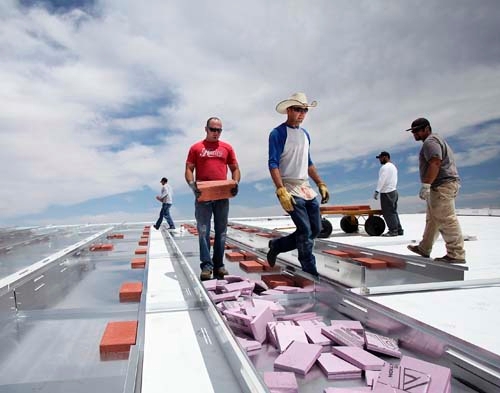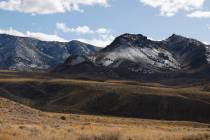Progress of Nevada’s renewable sector left uncertain after session


After a tug-of-war between green energy advocates and utility power players during the Nevada Legislature, the debate continues about whether the Silver State went forward or backward in its goal to become a renewable energy leader.
Energy and utility bills, and bill requests, were prolific in the 2011 legislative session. Measures dealing with creation of a transmission authority and building a transmission line to California, as well as increasing the number of solar-equipped homes and giving rebates to green businesses, were offered for consideration.
Some were disappointed in the results.
“We had opportunities, and we receded,” renewable energy advocate Louise Helton said of the session that adjourned June 6.
Particularly disheartening to Helton was the passage of Assembly Bill 150, which amended state law to allow electric providers to use the implementation of energy-efficiency measures to count toward the required 15 percent renewable energy portfolio standard for 2011 and 2012.
A member of the U.S. Green Building Council and the owner of the 1 Sun Solar energy installation company, Helton views the passage of AB150 as a step backward.
“We have part of the renewable-energy portfolio not needing to be renewable energy,” she said. “When you look at other states, they are gearing up. We are losing ground.”
But solar building and incentive programs are costly for utility customers, Tony Sanchez, senior vice president of government and community strategy for NV Energy, pointed out.
“Energy efficiency is the cheapest way to meet the portfolio standard.”
POWER LINE DRAWS VETO
Grabbing most of the attention was the passage of Assembly Bill 416, and a last-minute amendment allowing NV Energy to build a transmission line to carry renewable energy for sale to California. Critics charged that the bill could put Nevadans on the hook for about $1 billion in construction costs, and Gov. Brian Sandoval vetoed the bill Friday, saying it could have put an “unfair burden” on Nevada ratepayers.
In vetoing the bill, Sandoval pointed to concerns raised, including those about provisions that could allow NV Energy to recover energy exportation costs, sometimes without prior approval.
Sanchez strongly denied Nevada residents were to pick up the tab.
“Let us be very clear. We are not going forward with these transmission programs unless the users will pay for this,” the NV Energy vice president said Thursday. “In California’s case, it would be the California market.”
The Public Utilities Commission, however, would have had to decide what kind of financial risks Nevada ratepayers could have faced, Sanchez said.
AB416 would have also allowed NV Energy to pay renewable-energy rebates for small- and medium-sized businesses over time, rather than all at once.
“If someone spends $30,000 or $40,000 for a solar (power) system, through our solar generation project, we will pay a third of (the rebate) each year, for (five) years,” Sanchez said.
By spreading out the repayment, NV Energy would not have had to raise customers’ power bills as much to pay for the phased-in renewable rebates, Sanchez said.
Assembly Bill 287, another bill that failed, would have established a public body to serve as the Nevada Renewable Energy Transmission Authority. Helton viewed the option of NV Energy serving in the role of the renewable authority as a possible conflict of interest.
Chris Brooks, renewable-energy director for Bombard Electric, said Nevada and NV Energy are doing a good job of helping the state become a renewable energy leader.
“I think there is enough being done for the industry,” Brooks said.
NET METERING LIMIT RAISED
One successful measure, Senate Bill 59, could directly affect solar-installation businesses such as Bombard and 1 Sun Solar. The measure increased the limit for net metering among NV Energy customers from 1 percent to 2 percent of the utility’s peak load.
With net metering, power customers install alternative energy systems and get credit on their bills for excess power generated. The credits cannot exceed the customer’s power bill.
Helton said she was disappointed that SB59 did not raise the net metering cap to the originally proposed 5 percent. Allowing a profit for those generating alternative energy would spur solar growth, she added.
But NV Energy is nowhere near the existing 1 percent limit for net metering. Furthermore, Sanchez said, all power customers ultimately pay for going green.
“We are not against building more renewable energy projects,” he said. “We are against saddling our customers with the cost.”
Contact reporter Valerie Miller at
vmiller@lvbusinesspress.com or 702-387-5286.


















